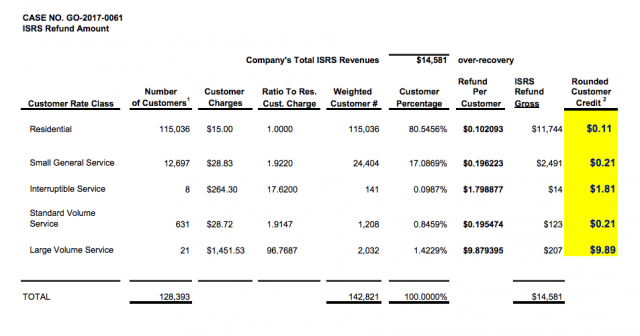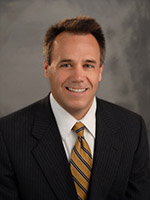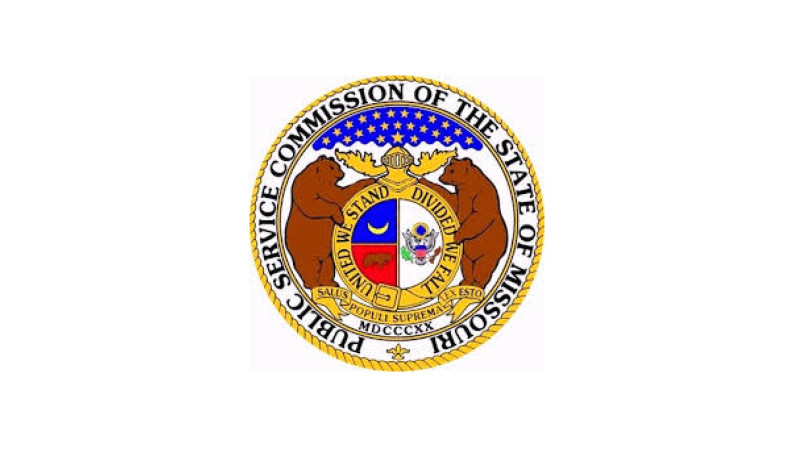JEFFERSON CITY, Mo. – Customers of Ameren Missouri could soon see a small one-time credit added to their bill because the company filed a tariff with the Missouri Public Service Commission, seeking to revise their infrastructure system replacement surcharge (ISRS) values.
The revisions reset the company’s values to zero, effectively eliminating the ISRS.
Because of the approved measure, Ameren must reconcile a total credit amount of $14,581 with customers for the February 2017 billing cycle.
The PSC staff outlined the ISRS refund amounts, which shows that residential customers receiving the credit will get an estimated 11 cents.
Here are the total estimated refunds to be issued:

The Commission has directed Ameren to put the bill credits on the February 2017 billing cycle.
The PSC is continuing to work with the Office of Public Counsel (OPC) in the matter of Ridge Creek Water Company’s request to increase the general rate. In Wednesday’s agenda meeting, the commission unanimously approved a measure compelling Ridge Creek to respond to OPC’s request for data.
The OPC says that they have made numerous phone calls and emails to the company, all of which were ignored.

“Those requests should have been complied with, and were not,” Chairman Daniel Hall said.
In addition to that, the commission also approved a financing application in the amount of $797,000 for the Terre Du Lac Utilities Corporation.
Terre Du Lac is a water and sewer service providing utilities to approximately 1,302 customers in Washington and St. Francois counties.
Specifically, the company wanted approval from the PSC to pledge 380 shares of stock and grant a security interest in all of their equipment, contracts, and receivables.
After reviewing their application, the commission ruled that it is “not detrimental to the public interest for Terre Du Lac to borrow up to $797,000 in long-term secured debt” and unanimously approved the order.
The one issue that showed dissent between the commissioners was Laclede Gas Company’s report and order.
The order centered on two issues on the company’s eligibility for an ISRS: the replacement and patching of lines and hydrostatic testing.
All of the commissioners agreed on the rules applied toward the issue of patching pipes, but Commissioner Scott Rupp differed in opinion from the rest of the commission on the issue of expense recovery for hydrostatic testing.
The rest of the commission stated they believed statute concerning hydrostatic testing only applies to newly-laid pipes, not already existing lines.
“There needs to be a physical improvement on the lines for it to be eligible,” Chairman Hall said. “We’re not saying it is inappropriate to do the testing; I believe it was, and we are not indicating that it should not have been done. We’re simply saying that the statute provides for an exception to the normal recovery of expenses.”
Commissioner Rupp was the only member to vote “No” on the order, saying he would not support the order because he could not agree on the hydrostatic testing.
“To me, it was prudent, it was smart, and they needed to do the testing,” he said. “If there was something wrong with the line, we would include it, if not, we would not. It was difficult for me to get past that sentiment and reach the legal argument.”
The commission spent little time on the final two orders, which focused on DSIM rider rate adjustments and true-ups for Kansas City Power & Light Company and KCP&L Greater Missouri Operations Company.
Both were approved unanimously in a matter of minutes, with little discussion.
Benjamin Peters was a reporter for The Missouri Times and Missouri Times Magazine and also produced the #MoLeg Podcast. He joined The Missouri Times in 2016 after working as a sports editor and TV news producer in mid-Missouri. Benjamin is a graduate of Missouri State University in Springfield.










